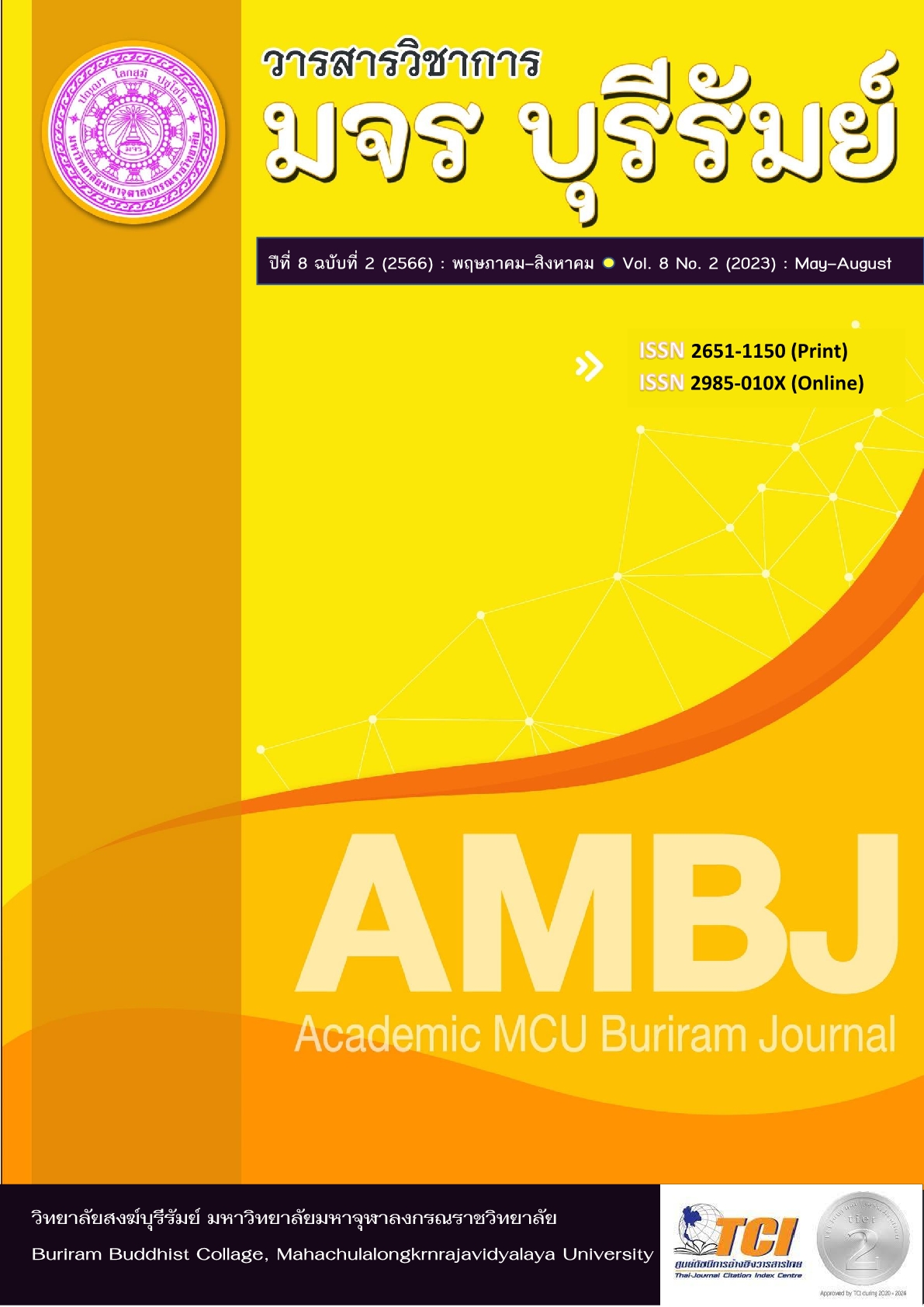An Analytical Study of Concept of Sammasankappa in the Noble Eightfold Path of Theravada Buddhist Philosophy
Keywords:
Concept of Sammasankappa, The Noble Eightfold, Theravada Buddhist PhilosophyAbstract
The purpose of this research were: 1) to study of Sammasankappa (Right Thought) in the Noble Eightfold Path of Theravada Buddhist Philosophy, 2) to analyze the concept of Sammasankappa (Right Thought) of Theravada Buddhist Philosophy and 3) to analyze an applying guideline the concept of Sammasankappa (Right Thought) of Theravada Buddhist Philosophy. This is a documentary research by collecting data from the Tripitaka, Commentary, academic documents on Buddhism and philosophy, and researches related to Sammasankappa (Right Thought).
The research results found that:
1. Sammasankappa in the Eightfold Path of Theravada Buddhist Philosophy was mental process, consisted of 3 points: 1) Nekkhamma Sammasankappa (ill-advised intentions) or Nekkhamma-vitakka (thought freed from lust) was not immersed oneself with things satisfying various cravings; as it freed from sensuality or greed, 2) Abyapada Sammasankappa (Thoughts do not interfere with each other) or Abyapada-vitakka were considered as it freed form hatred, and 3) Avihimsa Sammasankappa or Avihisa-vitakka meant thought considered as it freed form anger.
2. To analyze the concept of Sammasankappa of Theravada Buddhist Philosophy was a starting point for practice. It was the result of a person's reasonable use of right views properly. It was considered as the starting point of idea, lead to verbal and physical action for the ultimate goal eliminated greed, hatred, and delusion. Those defilements clang in our mind. Practical principles should be conformed to the Threefold Learning and Mahasatipatthana Sutta (The sutra on the cultivation of mindfulness) should apply for practice in daily life.
3. To analyze an applying guideline the concept of Sammasankappa of Theravada Buddhist Philosophy divided into 2 ways: 1) using important virtues for living to increase our thought from sensual desires, called wisdom. The important virtue was to increase our thought with carelessness. We should endure. We should increase an important virtue for thought of non-exploit, 2) daily living under the Threefold Learning. We should comprise of precepts, concentration, and wisdom. And we should practice under Mahasatipatthana-Sutta with developing our mindfulness in daily life.
References
พระเทพญาณมงคล และคณะ. (2558). คู่มือการศึกษาสัมมาปฏิบัติไตรสิกขา. นครปฐม: เพชรเกษมพริ้นติงกรุ๊ป.
พระเทพเวที (ประยุทธ์ ปยุตโต). (2553). วิธีคิดตามหลักพุทธธรรม. กรุงเทพมหานคร: สำนักพิมพ์ปัญญา.
พระธรรมกิตติวงศ์ (ทองดี สุรเตโช). (2548). พจนานุกรมเพื่อการศึกษาพุทธศาสน์ ชุดคำวัด. กรุงเทพมหานคร: เอกสารอัดสำเนา.
พระธรรมปิฎก (ป.อ.ปยุตฺโต). (2546). พุทธธรรม ฉบับปรับปรุงและขยายความ. พิมพ์ครั้งที่ 11. กรุงเทพมหานคร: โรงพิมพ์มหาจุฬาลงกรณราชวิทยาลัย.
พระพรหมคุณาภรณ์ (ป.อ.ปยุตฺโต). (2549). ชีวิตที่สมบูรณ์. พิมพครั้งที่ 11. กรุงเทพมหานคร: สำนักพิมพ์ระฆังทอง.
พระพรหมคุณาภรณ์ (ป.อ.ปยุตฺโต). (2556). พุทธธรรม ฉบับขยายความ. พิมพ์ครั้งที่ 42. กรงเทพมหานคร: สำนักพิมพ์ผลิธัมม์ ในเครือ บริษัทสำนักพิมพ์เพ็ทแอนด์โฮด จำกัด.
พระพรหมคุณาภรณ์ (ป.อ.ปยุตฺโต). (2551). พจนานุกรมพุทธศาสน์ ฉบับประมวลศัพท์. พิมพ์ครั้งที่ 11. กรุงเทพมหานคร: สำนักพิมพ์จันทร์เพ็ญ.
มหาจุฬาลงกรณราชวิทยาลัย. (2539). พระไตรปิฎกภาษาไทย ฉบับมหาจุฬาลงกรณราชวิทยาลัย. กรุงเทพมหานคร: โรงพิมพ์มหาจุฬาลงกรณราชวิทยาลัย.
ราชบัณฑิตยสถาน. (2546). พจนานุกรม ฉบับราชบัณฑิตยสถาน พ.ศ. 2542. กรุงเทพมหานคร: บริษัทนานมีบุ๊คส์พับลิเคชั่นส์.
วัฒนา พลชาติ. (2553). ศึกษาวิเคราะห์วิธีการพัฒนาปัญญาตามแนวคิดของพระพรหมคุณาภรณ์ (ป.อ. ปยุตฺโต). วิทยานิพนธ์พุทธศาสตรมหาบัณฑิต. บัณฑิตวิทยาลัย: มหาวิทยาลัยมหาจุฬาลงกรณราชวิทยาลัย.
Downloads
Published
How to Cite
Issue
Section
License
Copyright (c) 2023 Academic MCU Buriram Journal

This work is licensed under a Creative Commons Attribution-NonCommercial-NoDerivatives 4.0 International License.
ทัศนะและความคิดเห็นที่ปรากฏในบทความวารสารฉบับนี้ถือเป็นความรับผิดชอบของผู้เขียนบทความนั้น ไม่ถือเป็นทัศนะและความรับผิดชอบของบรรณาธิการ





